- Home
- Leslie Meier
Wicked Witch Murder Page 13
Wicked Witch Murder Read online
Page 13
“I’ll bring it over tomorrow,” promised Lucy.
“Come for lunch,” suggested Rachel. “Miss T. loves to gossip with you.”
So at noon, Lucy arrived at Miss Tilley’s little Cape Cod cottage with the cat in a plastic carrier box. Miss Tilley was in her usual wing chair next to the fireplace, and Lucy set the box down on the Oriental carpet in front of her and opened the gate. They waited as a sleek brown head emerged, whiskers twitching and sapphire blue eyes surveying the scene. Then with one elegant leap, the Siamese landed in Miss Tilley’s lap, where she planted her forelegs on the old woman’s chest and raised herself until they were eye to eye. Miss Tilley remained motionless as the cat sniffed at her face, whipping her long brown tail from side to side. Then, apparently satisfied, the cat settled itself like a Sphinx on Miss Tilley’s knees.
“My heavens,” she said. “That was quite an unusual greeting.”
“I guess you passed inspection.” Rachel laughed. “The question is, how do you feel about the cat?”
“I think I’m in love,” replied Miss Tilley, gently stroking the animal’s back with her blue-veined hand. “I’ve never seen such a beautiful creature.”
“What are you going to name her?” asked Lucy.
“Perhaps Cleopatra, but I’m not sure. I need a little time to know her better.”
Lucy smiled. “From my brief acquaintance with her, I can tell you that’s a perfect choice.”
“Cleopatra it is, then,” said Miss Tilley. “Now, Lucy, you must bring me up to speed on all the local scandals—the news that’s not fit to print.”
Rachel left the two alone and went in the kitchen to put the finishing touches on lunch while Lucy brought Miss Tilley up to date on her new neighbors and the plans for the Halloween party.
“What about that poor magician?” asked Miss Tilley, just as Rachel announced lunch was ready.
Lucy picked up the sleeping Cleopatra and shifted her to a sunny spot on the sofa, then gave Miss Tilley an arm to hold as she hoisted herself out of the chair. “I don’t think there’s been any progress,” she said as they walked arm in arm to the dining room. “I did learn that a developer over in Shiloh wanted to buy Malcolm Malebranche’s property but that he was refusing.”
“Sounds like a motive to me,” said Miss Tilley as Lucy held her chair for her.
“I thought so, too, until I talked to the developer, who turned out to be a really nice guy,” said Lucy, taking her usual seat. As always, the table was set beautifully with a blue and white homespun cloth and matching napkins, monogrammed family silver, antique flow-blue plates, and a lusterware pitcher bursting with pink cosmos from the garden.
“They’re the ones you have to watch out for,” said Miss Tilley as Rachel brought in the blue and white Canton tureen filled with deliciously fragrant beef stew.
“You know,” said Rachel as she ladled out bowlfuls, “I’ve been reading that play The Crucible, for an audition….’
“I didn’t know the Village Players did such serious stuff,” said Lucy, passing the basket of rolls. She knew Rachel had recently appeared in several productions with the local amateur troupe.
“I’m going big-time. It’s with a theater group in Portland.”
“Rachel’s turning into quite an actress,” said Miss Tilley, beaming with pride.
“I probably won’t get the part,” said Rachel, blushing. “But I was struck with something in the play. There’s this character, Miles Corey, and he endures the most painful, agonizingly slow death, because he refuses to admit he is a witch, in which case they would simply hang him and get it over with. But he stubbornly endures two days of torture because if he admitted to being a witch, his land would be confiscated and his children disinherited.”
Lucy stabbed a piece of meat with her fork and chewed thoughtfully. “I don’t think Malebranche’s land was the motive. It seems more likely that somebody had a personal motive for killing him.”
“Continue,” Miss Tilley ordered Lucy, impatient with the delay as Lucy chewed a piece of meat. “It’s obvious you know something that you’re not telling us,” said Miss Tilley, narrowing her blue eyes.
“All I’ve really got is a hunch,” said Lucy.
“We’re dying to hear it,” said Rachel.
Lucy sighed. “Okay, this is my theory, for what it’s worth. You know Malcolm was the high priest of this coven?”
“Diana’s coven,” added Rachel.
“Right. Well, Diana told me that Malcolm initiated her into the high priesthood by having sex with her, that sex is part of their rites and observances.”
“Oh,” said Rachel, her eyes wide with shock.
“Hmmm,” said Miss Tilley in a tone of disapproval. “That would never happen in the Methodist church.”
“And I figure that when you add sex to the equation, you have to deal with a whole lot of emotions and hurt feelings and jealousy. There could be a jilted lover, somebody’s jealous boyfriend, even an enraged father. The problem is, Diana won’t reveal the names of the members of the coven. And neither will the police.”
“Nothing gets people quite as riled up as sex,” said Miss Tilley, who was proud of being a maiden lady.
“Speaking of which, I thought for a while that we were going to have a Salem-style witch hunt on our hands,” said Rachel, buttering a roll. “Ike Stoughton was really trying to get something going.”
“He’s been distracted,” said Lucy. “There was the flood and his sick wife—I think he’s got his hands full.”
“I was worried too,” said Miss Tilley, looking very serious. “I was afraid for Rebecca Wardwell.”
Lucy was puzzled. “That’s what Rachel told me. That Ike seemed to think Rebecca was a witch, too, and somehow hexed his pumpkins.”
“She is a witch,” asserted Miss Tilley with a sharp nod. “She’s not one of these silly modern pretend witches with their crystals and candles—she’s a real witch.”
Lucy’s and Rachel’s eyes met across the table. “A real witch?” asked Lucy.
“She was born a witch. She even has a mark on her back, a witch’s mark. She showed it to me once.” Miss Tilley speared a piece of carrot. “Her mother was a witch, and her grandmother was a witch too. It runs in the family, like those Mumfords all have red hair and freckles.”
“She certainly keeps a low profile,” said Rachel. “I would never have guessed.”
“Oh, she’s not showy like that Diana Ravenscroft,” said Miss Tilley, popping the bit of carrot into her mouth.
“Come to think of it,” said Lucy, “she does have some pretty amazing abilities.”
“Like tickling trout,” volunteered Miss Tilley. “I’ve seen her do it.”
“She started my car one day when it stalled,” said Lucy. “And when Diana had that awful case of poison ivy, she gave me this bottle of stuff that cured it overnight, absolutely cleared it up.”
“She could sell that stuff and make a fortune,” observed Rachel.
“Oh, no, she would never sell it,” said Miss Tilley, growing serious. “That’s why I’m worried about her, you know. She’s not practical. She lives in her own world, all those old-fashioned clothes and no telephone. She says she doesn’t need one, but how would she get help if she needed it?”
“I don’t think you need to worry,” said Lucy. “She seems to manage very well.”
“Well, I’d feel better if you’d check on her now and then for me,” said Miss Tilley, setting her knife and fork together on her plate, signaling she was done eating.
“That’s no hardship,” said Lucy. “I often stop there to buy eggs and vegetables.”
“Well, that’s settled, then,” said Miss Tilley, turning to Rachel. “What’s for dessert?”
“Blueberry pie,” said Rachel.
Miss Tilley smacked her lips. “My favorite.”
Lucy decided she might as well make good on her promise as she drove back to work, so she detoured out to Rebecca’s farmlet by the inte
rstate. A cluster of fast-food restaurants and gas stations had sprouted near the exit ramps, but a large parcel of conservation trust land preserved an extensive old-growth forest. Rebecca’s farm was adjacent to this woodland, and visiting there was like taking a trip back in time. When Lucy climbed out of her car, she felt as if she were stepping right into a Currier & Ives print.
Rebecca’s little porched cottage was surrounded by flowers, and climbing roses clambered over the wood-shingled roof. A little flock of chickens pecked around in the yard, and goats peered at her curiously over their fence. The goats’ pen was next to the barn, which was connected to the house in traditional Maine style by a woodshed, allowing sheltered access during heavy winter snows. Neat rows of vegetables in raised beds filled the area beyond the barn, and Lucy could see Rebecca working out there in her old-fashioned dress and straw sunbonnet, absorbed in her task of picking beans. She looked up, however, just as Lucy was about to call out to her.
“I’m coming,” she shouted with a wave.
Lucy watched as she approached with her picking basket over her arm and a tiny owl on her shoulder.
“This is such a busy time,” said Rebecca, unlatching the gate. “The beans just keep coming and coming, and there’s the Swiss chard and the zucchini and summer squash—it’s really all I can do to keep up. And I’ve got to keep an eye on my pumpkins. I’ve got high hopes for some of them.”
“Are you growing them for the giant pumpkin contest?” asked Lucy, fascinated by the little owl.
Rebecca nodded. “If the weather cooperates, I might have a winner this year.”
“Who’s your friend?” asked Lucy, watching as the little owl groomed its feathers. “Oops, I didn’t mean to make a pun.”
“He’s Oz, my faithful companion,” said Rebecca, indicating the bird on her shoulder. He stared at Lucy with large, unblinking golden eyes.
“I thought owls sleep in the daytime.”
“He takes a nap in the morning, but then he’s on the job, keeping an eye out for mice.”
“So he earns his keep,” said Lucy.
“Yes, indeed. He’s a working member of this corporation,” said Rebecca, getting down to business. “What can I get you today?”
“I’ve got beans,” said Lucy. “But I could use a dozen eggs and some of your amazing yogurt.”
“Goats’ milk is the best. The fat doesn’t separate out,” said Rebecca, approving her choice. “I also have herb plants for sale, around on the side—I know you’re quite a gardener yourself.”
Lucy was definitely interested. She was always looking for new plants to add to her herb garden. “I’ll go take a look,” she said.
“You do that while I fetch your eggs and yogurt,” said Rebecca. “One quart? Two?”
“Just one, and I’ll take a quart of raspberries too,” said Lucy, planning to serve a healthful dessert.
She wandered along the path that led past the goat pen to the side of the barn. There she found a neat herb garden enclosed by a low boxwood hedge. The plants that Rebecca was offering for sale had been potted up and were arranged on a low bench against the barn wall, but Lucy decided to look over the garden before making her choice.
She was familiar with most of the plants: parsley, lavender, thyme, sage, yarrow, sweet woodruff, and lady’s bedstraw that grew between the flagstones in the walkway. Some were new to her, however, especially one rather large handsome plant that bore a slight resemblance to a tomato plant. She remembered seeing it, or something very similar, growing in Ike Stoughton’s garden.
“What’s this?” she asked as Rebecca approached with her purchases in a recycled supermarket bag. “It’s quite impressive.”
“Belladonna,” said Rebecca, her tongue lingering over the name. “It’s one of my favorites. The name means ‘beautiful woman.’”
“Do you have any for sale?” asked Lucy.
“No,” said Rebecca. “It’s a bit tricky to grow; it’s not for everyone. But I do have some lovely lady’s mantle, if you’re interested. It has beautiful bright green flowers that bloom just when the roses do, and you can make gorgeous arrangements. The leaves are shaped like an old-fashioned cape—I have one very much like them myself.”
“Is it hard to grow?”
“Not at all. Just give it lots of sun and room to sprawl. That’s it there, by the sundial.”
“I have just the spot for that,” said Lucy, as Oz suddenly rose from Rebecca’s shoulder and spread his wings. They were enormous for such a small bird, easily spanning more than a foot. He seemed to float silently over the neat garden, barely moving his wings, until he uttered a sharp cry and dropped straight down between two rows of beans.
“Murder is afoot, I’m afraid,” said Rebecca with a rueful smile. “Mr. Mouse won’t be coming home tonight. I hope Mrs. Mouse won’t miss him too much.”
“She has the children to console her,” said Lucy.
“Plenty of them.” Rebecca laughed. “And probably more on the way.”
“Well, I mustn’t keep you,” said Lucy with a regretful sigh as she inhaled the lemony, musky garden scent that filled the air. “It’s so lovely here. I could stay all day. Is it always this peaceful?”
Rebecca seemed to hesitate for a moment, and Lucy wondered if she was anxious about something, but then she smiled. “I strive to live in harmony with nature—that’s why it seems so peaceful.”
“So that’s the secret. I’ve got to live in harmony with a husband, four kids, and a boss! So how much do I owe you?”
Rebecca pronounced a shocking sum, but Lucy paid up gladly, telling herself it was important to encourage local growers. And besides, she reminded herself as she carried off her purchases, she’d gotten more than her money’s worth, because shopping at the farmlet was a sensual experience. She’d feasted her eyes on beauty, she’d felt the warm sun on her skin, she’d inhaled the heady fragrances of the herbs, and she’d heard the cry of the owl. And now, as she started the car, she was tasting the incomparable flavor of a sun-ripened raspberry.
Back in the office, Lucy found a stack of papers on her desk.
“Ted wants you to go through those letters and decide which ones to print. When you’re done with that, I need you to proofread the legals for me.”
“Okay,” said Lucy with an obvious lack of enthusiasm. Picking the letters wasn’t so bad, but reading those complicated and lengthy legal ads was a tiresome chore. However, it did sometimes yield a story, like when a millionaire CEO who owned a luxurious summer home featured in several shelter magazines was included in the town treasurer’s annual list of unpaid real estate taxes. That was quite a scoop, but the ads were rarely that interesting, so Lucy started with the letters.
They included the usual complaints about town officials who wasted the taxpayers’ money, thank-yous to the rescue squad paramedics for their “quick response and considerate behavior,” and promos for upcoming events such as the Hook Fishermen’s “Hookers’ Ball” and the “Twice Round the Cove” road race. Lucy decided to focus on the positive this week and set the complaints aside; she was trying to decide which worthy event to include when Phyllis handed her some new letters that had just been delivered.
“Wilf just brought these,” she said, in that special voice she used for the mailman.
“How’s that going?” asked Lucy, taking the letters. “Is he still bringing you flowers and taking you out to dinner?”
“Yes, he is,” said Phyllis, checking her reverse French manicure with white nails tipped with coral. It was the latest thing, according to Phyllis, and all the rage at the nail salon.
“You’re a lucky girl,” said Lucy. “He’s a real gentleman.”
“Don’t I know it,” said Phyllis, gazing out the window and watching as her knight in shining armor—actually blue shorts—proceeded across the street, pushing his little wheeled cart. “He’s such a romantic. It’s kind of hard not to disillusion him.”
“You’re afraid of falling off the pedestal?
” asked Lucy, attacking the handful of envelopes with her letter opener.
Phyllis grimaced. “I’m not sure our relationship would survive the crash.”
“I don’t think you need to worry,” said Lucy, extracting one of the letters and unfolding it. “You’ve got a lot going for—” She stopped abruptly as she read the letter. “Here we go again.”
“What?” Phyllis was leaning over her shoulder to read the letter, and Lucy could smell her Jean Naté body splash.
“It’s Ike Stoughton, going after Diana Ravenscroft again.”
“He doesn’t mince his words, does he?” said Phyllis. “‘Ungodly wickedness, undermining parental authority, corrupting the town’s youth…’”
“‘Must not be allowed to continue,’” quoted Lucy. “He’s calling on the town’s God-fearing citizens to take whatever steps are necessary to rid the town of this, and here I quote, ‘suppurating sore.’”
“What exactly is a suppurating sore?” asked Phyllis.
“I’m not sure, but it sounds disgusting,” said Lucy, unfolding the next letter. “Oh, no!” she exclaimed, reading it. “This is another one, but it’s from Cynthia Brock.”
“She’s a crank, isn’t she?”
“Yeah, she usually writes about the school budget.” Lucy was opening another letter. “My gosh, this is another one.”
“It must be a campaign,” suggested Phyllis. “I bet Ike Stoughton’s behind it.”
“I think you’re right,” said Lucy, quickly flipping through the remaining letters. “They’re all practically identical.”
“Are you going to print them?” asked Phyllis.
“Not me,” said Lucy, clipping the letters together and putting them on Ted’s desk. “This is one for the boss.”
Lucy went ahead and compiled a selection of less inflammatory letters for the editorial page and sent it to Ted’s queue, figuring he could substitute one or two of the anti-witch letters if he wanted. If it was up to her, she would get the story behind the letters and print that, but it wasn’t her call. Glancing at the clock, she realized she had plenty of time left for the legals—too bad.

 Christmas Card Murder
Christmas Card Murder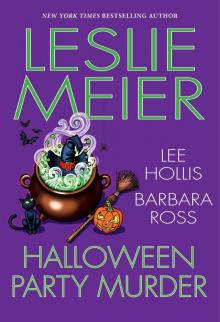 Halloween Party Murder
Halloween Party Murder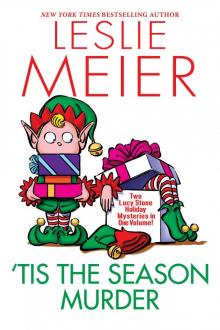 'Tis the Season Murder
'Tis the Season Murder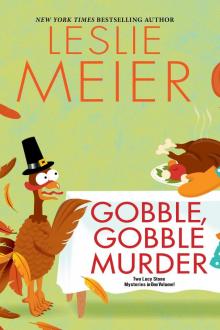 Gobble, Gobble Murder
Gobble, Gobble Murder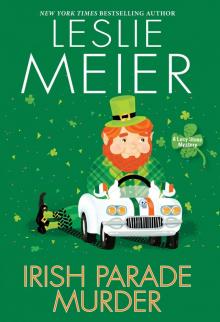 Irish Parade Murder
Irish Parade Murder Bake Sale Murder
Bake Sale Murder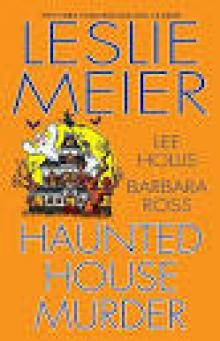 Haunted House Murder
Haunted House Murder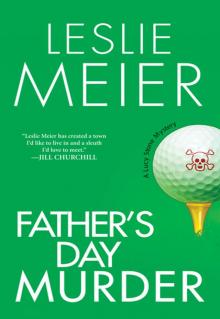 Father’s Day Murder
Father’s Day Murder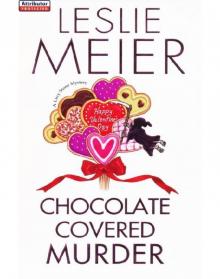 Chocolate Covered Murder
Chocolate Covered Murder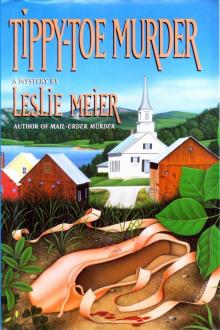 Tippy Toe Murder
Tippy Toe Murder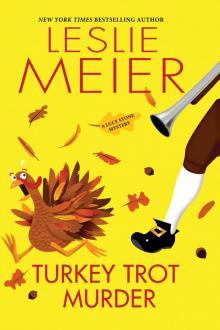 Turkey Trot Murder
Turkey Trot Murder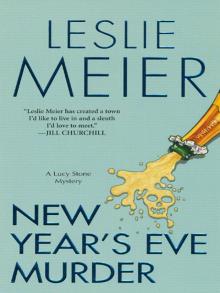 New Year's Eve Murder
New Year's Eve Murder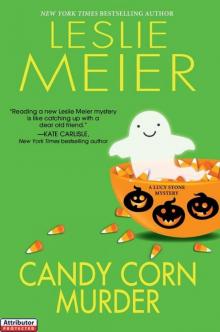 Candy Corn Murder
Candy Corn Murder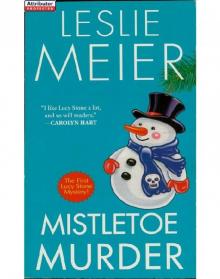 Mistletoe Murder
Mistletoe Murder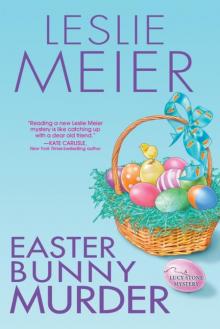 LStone 20 - Easter Bunny Murder
LStone 20 - Easter Bunny Murder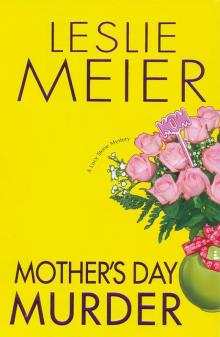 Mother's Day Murder
Mother's Day Murder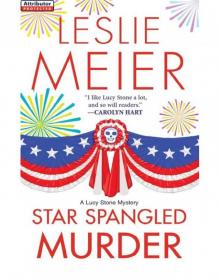 Star Spangled Murder
Star Spangled Murder Silver Anniversary Murder
Silver Anniversary Murder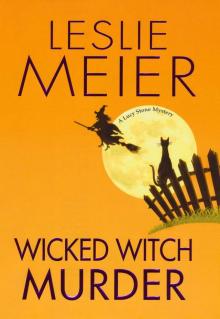 Wicked Witch Murder
Wicked Witch Murder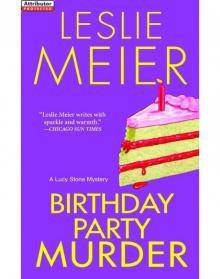 Birthday Party Murder
Birthday Party Murder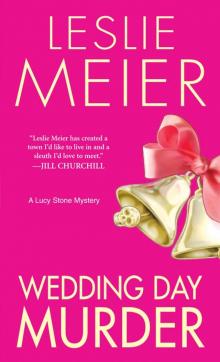 Wedding Day Murder
Wedding Day Murder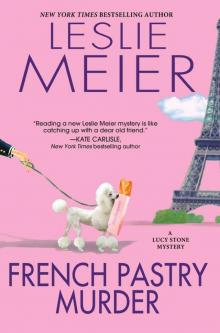 French Pastry Murder
French Pastry Murder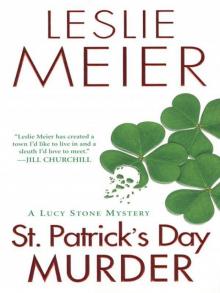 St. Patrick's Day Murder
St. Patrick's Day Murder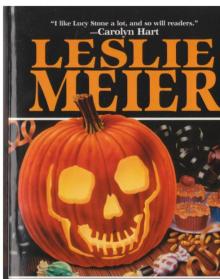 Trick or Treat Murder
Trick or Treat Murder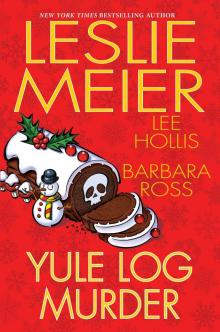 Yule Log Murder
Yule Log Murder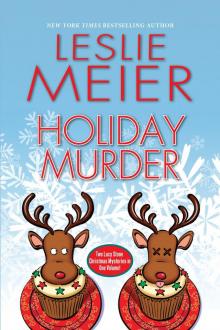 Holiday Murder
Holiday Murder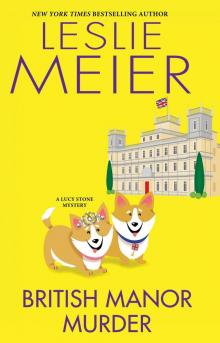 British Manor Murder
British Manor Murder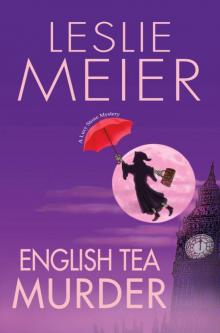 English Tea Murder
English Tea Murder